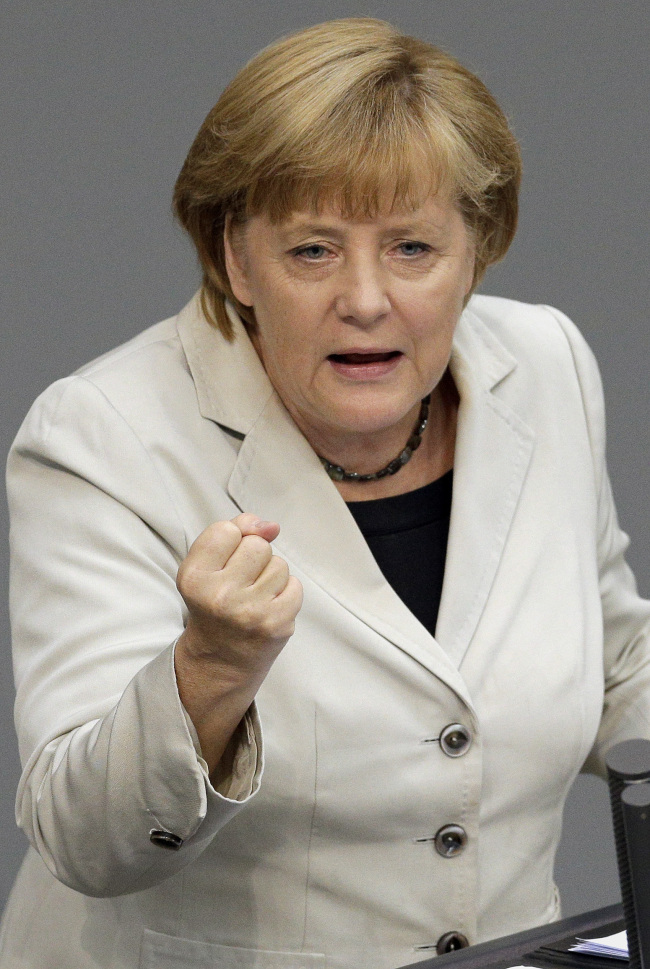 |
German Chancellor Angela Merkel speaks during a budget debate in Berlin on Wednesday. ( AP-Yonhap News) |
German backing for Europe’s bailout fund quickened the bargaining over a bond-buying program for Spain, testing the resolve of government leaders and the European Central Bank to conquer the debt crisis.
Spain is pressing for an ECB intervention with no strings attached, while creditors led by German Chancellor Angela Merkel are reluctant to lend more money. Mario Draghi’s central bank is waiting for the two sides to commit before it wades back into the bond market.
After yesterday’s “Super Wednesday” in crisis politics marked by relief over the German supreme court’s endorsement of the $645 billion rescue fund, the question of a credit line or full loan program for Spain is set to dominate a two-day meeting of finance ministers starting tomorrow in Nicosia, Cyprus.
“Now we can say that Europe has in place a powerful backstop in terms of financial support,” Organization for Economic Cooperation and Development chief economist Pier Carlo Padoan told Bloomberg Radio’s Ken Prewitt yesterday. “It does not fix finally the problem but certainly it is very important progress.”
Discussions at the finance meeting will also touch on Greece’s bid for easier aid terms and Cyprus’s efforts to escape a bailout, with no decisions until at least October, a European official told reporters in Brussels on Sept. 10.
The officials will also have a first look at yesterday’s proposals to make the ECB the center of a bank-supervision system ― the newest plank in what European Commission president Jose Barroso labeled a “federation of nation states” that could take shape starting in 2014.
For now, investors saluted the German decision for Europe’s crisis-containment strategy, unleashing gains in the euro, stocks and peripheral countries’ bonds. Spain’s extra 10-year borrowing cost over German levels fell to 398 basis points yesterday from a peak of 638 basis points on July 24.
In Madrid, Prime Minister Mariano Rajoy took the advance as a sign that Spain, already tapping 100 billion euros of aid for its banks, can get by without support from the rescue fund and a remodeled version of the ECB bond-purchase program that briefly propped up its debt market last year.
“I don’t know if it’s necessary for Spain to ask for it, let’s see how the risk premium evolves,” Rajoy told the Spanish parliament.
Spain would have to negotiate a credit line or loan package from the taxpayer-financed rescue fund before the ECB intervenes. A fight is brewing over the conditions ― budget cuts and economic reforms ― with Rajoy saying Spain has already done enough to deserve the help.
“Any application ― and the court made this very clear today ― must be approved by the German Bundestag,” Michael Meister, a top lawmaker in Merkel’s party, said in a telephone interview yesterday.
Spain is trying to avert the stigma of outsourcing control over its economic management to creditors, ultimately dominated by lawmakers in Germany, Europe’s largest economy and principal sponsor of 486 billion euros in aid pledged since Greece became the first crisis victim in early 2010.
The jousting between northern and southern Europe has taken on a harsher tone, leading Italian Prime Minister Mario Monti on Sept. 6 to float the idea of “a code of conduct for public remarks by the people who love to call themselves European leaders.”
Merkel’s dominance of the crisis response has split Europe, earning her favorability ratings of 74 percent in the Netherlands and 63 percent at home, while 63 percent in Italy and Spain voice disapproval, according to a poll released yesterday by the German Marshall Fund of the United States.
Voters in the Netherlands, one of four “AAA” rated countries left in the eurozone, went to the polls yesterday after a campaign dominated by economic distress at home and hostility to further bailouts. The results, pointing to a coalition of the two biggest parties, suggest no change in Dutch backing for her austerity-first crisis response.
Now in campaign mode for her own re-election in about a year, Merkel faces obstacles to getting parliamentary majorities to spend more bailout money. Equally, there is no Bundestag majority for kicking Greece out of the euro, making the two-term chancellor even less likely to take policy risks.
(Bloomberg)








